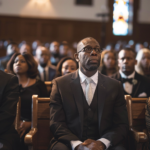|
Listen to this article
Getting your Trinity Audio player ready...
|
Sean Combs, widely known as P. Diddy or Puff Daddy, has long epitomized the “Bad Boy” persona he so carefully cultivated. From the heights of musical success to the depths of scandal, his story is a stark reminder of how a life built on rebellion and exploitation inevitably unravels. Behind the glamorous facade, lies a darker narrative of abuse, infidelity, and moral corruption. This article delves deep into the biblical and apocryphal condemnation of such behaviors, highlighting the stark contrast between Diddy’s actions and the laws of God.
The Rise of the Bad Boy
In the 1990s, Diddy became synonymous with the “Bad Boy” lifestyle. His label, Bad Boy Records, churned out hits, and he amassed a fortune, reveling in the public eye. He glorified being a “bad boy,” celebrating nonconformity and decadence in his music and personal life. This image, however, masked a reality fraught with moral decay.
The Dark Side of the Persona
Diddy’s persona wasn’t just an act; it extended to his private life. Allegations of sex trafficking, domestic abuse, and infidelity have surfaced over the years. Reports detail physical abuse against women like Kim Porter, and accusations of involvement in sex trafficking reveal a pattern of exploiting vulnerable individuals. These actions are a gross violation of ethical and moral standards, long overlooked by a culture that often rewards bad behavior.
Legal Repercussions
The legal system has begun to hold Diddy accountable. Lawsuits and criminal investigations underscore the consequences of a life steeped in sin. Victims have come forward, and the once-celebrated “Bad Boy” image is now a liability, with the legal system demanding justice for his actions.
Biblical and Apocryphal Condemnation
The Bible and apocryphal texts offer clear denunciation of such behavior. The Book of Proverbs 6:16-19 (KJV) lists behaviors that God abhors: “These six things doth the Lord hate: yea, seven are an abomination unto him: A proud look, a lying tongue, and hands that shed innocent blood, An heart that devises wicked imaginations, feet that be swift in running to mischief.” These verses reflect the moral failings of those who exploit and harm others.
In the Apocrypha, Ecclesiasticus (Sirach) 26:9-12 warns against the behavior Diddy embodies: “The whoredom of a woman may be known in her haughty looks and eyelids. If thy daughter be shameless, keep her in straitly, lest she abuse herself through overmuch liberty. Watch over an impudent eye: and marvel not if she trespass against thee. She will open her mouth, as a thirsty traveler when he hath found a fountain, and drink of every water near her: by every hedge will she sit down, and open her quiver against every arrow.”
Strange Apparel and Prostitution
Diddy’s penchant for flaunting wealth and encouraging sexual promiscuity goes against the teachings in Zephaniah 1:8 (KJV): “And it shall come to pass in the day of the Lord’s sacrifice, that I will punish the princes, and the king’s children, and all such as are clothed with strange apparel.” The Greek word for “strange apparel” (ἐξωτέρικος) implies outward appearances that mask inner corruption, a fitting description of Diddy’s lifestyle.
Additionally, the apocryphal text of Baruch 6:10 (KJV) speaks against the commodification of individuals, which parallels Diddy’s alleged involvement in sex trafficking: “And they that serve them are ashamed: for if they fall to the ground at any time, they cannot rise up again of themselves: neither, if one set them upright, can they move of themselves: neither, if they be bowed down, can they make themselves straight: but they set gifts before them, as unto dead men.”
Molestation and Moral Corruption
In Romans 1:26-27 (KJV), Paul condemns sexual immorality: “For this cause God gave them up unto vile affections: for even their women did change the natural use into that which is against nature: And likewise also the men, leaving the natural use of the woman, burned in their lust one toward another; men with men working that which is unseemly, and receiving in themselves that recompense of their error which was meet.” This passage reflects the broader condemnation of sexual exploitation and immorality.
God’s Laws vs. Man’s Laws
God’s laws, as outlined in both the Old and New Testaments, demand justice and righteousness. Micah 6:8 (KJV) says, “He hath shewed thee, O man, what is good; and what doth the Lord require of thee, but to do justly, and to love mercy, and to walk humbly with thy God?” These principles stand in stark contrast to Diddy’s actions.
In 1 Corinthians 6:9-10 (KJV), Paul warns against immoral behaviors: “Know ye not that the unrighteous shall not inherit the kingdom of God? Be not deceived: neither fornicators, nor idolaters, nor adulterers, nor effeminate, nor abusers of themselves with mankind, Nor thieves, nor covetous, nor drunkards, nor revilers, nor extortioners, shall inherit the kingdom of God.”
Redemption and Change
Despite the gravity of his actions, the Bible offers a path to redemption. 1 John 1:9 (KJV) promises, “If we confess our sins, he is faithful and just to forgive us our sins, and to cleanse us from all unrighteousness.” True repentance involves acknowledging wrongdoing, seeking forgiveness, and committing to a life aligned with God’s laws.
Conclusion
Sean “P. Diddy” Combs’ rise and fall is a poignant reminder of the consequences of living contrary to God’s commands. The legal system’s recent actions against him illustrate that no one is above the law. By reflecting on Diddy’s story, we are reminded of the importance of adhering to ethical and moral principles as laid out in the Scriptures. Through genuine repentance and a commitment to righteousness, even those who have strayed can find redemption.









